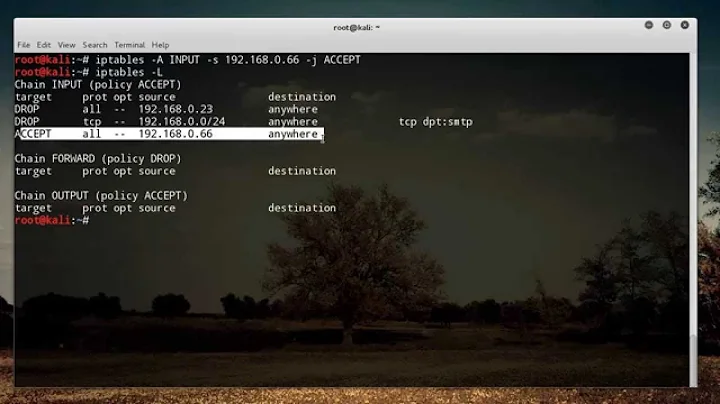Iptables rule to allow only one port and block others
We can make INPUT policy drop to block everything and allow specific ports only
# allow established sessions to receive traffic
iptables -A INPUT -m state --state ESTABLISHED,RELATED -j ACCEPT
# allow your application port
iptables -I INPUT -p tcp --dport 42605 -j ACCEPT
# allow SSH
iptables -I INPUT -p tcp --dport 22 -j ACCEPT
# Allow Ping
iptables -A INPUT -p icmp --icmp-type 0 -m state --state ESTABLISHED,RELATED -j ACCEPT
# allow localhost
iptables -A INPUT -i lo -j ACCEPT
# block everything else
iptables -A INPUT -j DROP
Another question, would this be the right way to test, or maybe I should use "netstat" command to see which port has connection established with the other ip?
Yes, you can check netstat -antop | grep app_port and you can also use strace :
strace -f -e trace=network -s 10000 PROCESS ARGUMENTS
To monitor an existing process with a known pid:
strace -p $( pgrep application_name) -f -e trace=network -s 10000
Related videos on Youtube
Gokul
Updated on September 18, 2022Comments
-
Gokul over 1 year
We have two apps running (on top of linux) and both communicates through port 42605. I wanted to quickly verify if this is the only port that's been used for communication between them. I tried below rule, but it doesn't seems to work. So, just wanted to get this clarified, if I am doing it wrong.
Following is the sequence of commands i ran
iptables -I INPUT -j REJECT iptables -I INPUT -p tcp --dport 42605 -j ACCEPT iptables -I INPUT -p icmp -j ACCEPT iptables -I OUTPUT -p tcp --dport 42605 -j ACCEPTSo, this will get added in reverse order since I am inserting it.
I wanted to allow incoming and outgoing communications from and to 42605. Does the above rule looks good or am I doing it wrong?
Another question, would this be the right way to test, or maybe I should use "netstat" command to see which port has connection established with the other ip?
-
 Admin about 10 yearsSince you're just doing research, instead of doing a
Admin about 10 yearsSince you're just doing research, instead of doing a-j REJECTyou should do a-j LOG. This is becauseREJECTwill drop the packet and send back an ICMPdestination unreachablepacket to the affected client.LOGwill just send the packet information to syslog (on most systems it ends up in/var/log/messages) then the packet is processed normally. SoREJECTwill likely break the application (at least temporarily) and you're at the mercy of what THAT causes the app to do, versus just logging the information and doing atail -fon/var/log/messages
-




